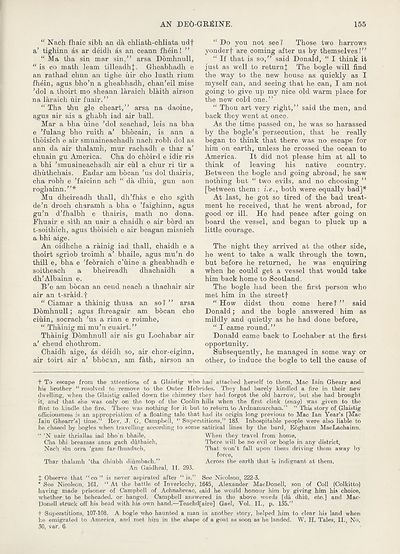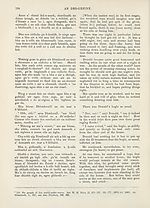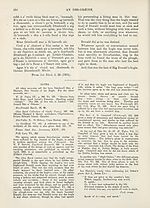An Comunn Gàidhealach Publications > Deo-gréine > Volume 17, October 1921 to September 1922
(163) Page 155
Download files
Complete book:
Individual page:
Thumbnail gallery: Grid view | List view

AN DEO-GREINE.
155
“ Nach fhaic sibh an da chliath-chliata udf
a’ tighinn as ar deidh as an ceann fhein! ”
“ Ma tha sin mar sin/’ arsa Domhnull,
“is co math learn tilleadhj. Gheabhadh e
an rathad chun an tighe uir cho luath rium
fhein, agus bho’n a gheabhadh, chan’eil mise
’dol a thoirt mo sheann laraich blaith airson
na laraich uir f'uair.”
“ Tha bhu gle cheart,” arsa na daoine,
agus air ais a ghabh iad air ball.
Mar a bha uine 'dol seachad, leis na bha
e 'fulang bho ruith a’ bhocain, is ann a
thbisich e air smuaineachadh nach robh dol as
ann da air thalamh, mur rachadh e thar a’
chuain gu America. Cha do chbird e idir ris
a bhi 'smuaineachadh air cul a chur ri tir a
dhuthchais. Eadar am bocan 'us dol thairis,
cha robh e 'faicinn ach “ da dhiu, gun aon
roghainn.”*
Mu dheireadh thall, dh’fhas e cho sgith
de’n droch charamh a bha e 'faighinn, agus
gu’n d’fhalbh e thairis, math no dona.
Fhuair e sith an uair a chaidh e air bord an
t-soithich, agus thoisich e air beagan misnich
a bhi aige.
An oidhche a rainig iad thall, chaidh e a
thoirt sgriob troimh a’ bhaile, agus mu’n do
thill e, bha e 'febraich c’uine a gheabhadh e
soitheach a bheireadh dhachaidh a
dh’Albainn e.
B’e am bocan an ceud neach a thachair air
air an t-sraid.f
“ Ciamar a thainig thusa an so? ” arsa
Dbmhnull; agus fhreagair am bocan cho
ciuin, socrach 'us a rinn e roimhe,
“ Thainig mi mu’n cuairt.”
Thainig Domhnull air ais gu Lochabar air
a’ cheud chothrom.
Chaidh aige, as deidh so, air chor-eiginn,
air toirt air a’ bhocan, am fath, airson an
“ Do you not see? Those two harrows
yonderf are coming after us by themselves!”
“ If that is so,” said Donald, “ I think it
just as well to return| The bogle will find
the way to the new house as quickly as I
myself can, and seeing that he can, I am not
going to give up my nice old warm place for
the new cold one.”
“ Thou art very right,” said the men, and
back they went at once.
As the time passed on, he was so harassed
by the bogle’s persecution, that he really
began to think that there was no escape for
him on earth, unless he crossed the ocean to
America. It did not please him at all to
think of leaving his native country.
Between the bogle and going abroad, he saw
nothing but “ two evils, and no choosing ”
[between them : i.e., both were equally bad]*
At last, he got so tired of the bad treat¬
ment he received, that he went abroad, for
good or ill. He had peace after going on
board the vessel, and began to pluck up a
little courage.
The night they arrived at the other side,
he went to take a walk through the town,
but before he returned, he was enquiring
when he could get a vessel that would take
him back home to Scotland.
The bogle had been the first person who
met him in the street!
“ How didst thou come here? ” said
Donald; and the bogle answered him as
mildly and quietly as he had done before,
“ I came round.”
Donald came back to Lochaber at the first
opportunity.
Subsequently, he managed in some way or
other, to induce the bogle to tell the cause of
f To escape from the attentions of a Glaistig who had attached herself to them, Mae Iain Ghearr and
his brother “ resolved to remove to the Outer Hebrides. They had barely kindled a fire in their new
dwelling’, when the Glaistig called down the chimney they had forgot the old harrow, but she had brought
it, and that she was only on the top of the Coolin hills when the first clink (mug) was given to the
flint to kindle the fire. There was nothing for it but to return to Ardnamurchan.” “ This story of Glaistig
offioiousness is an appropriation of a floating tale that had its origin long previous to Mac Ian Year’s [Mac
Iain Ghearr’s] time.” Rev. J. G. Campbell, “ Superstitions,” 183. Inhospitable people were also liable to
be chased by bogles when travelling according to some satirical lines by the bard, Eoghann MacLachainn.
“ ’N uair thriallas iad bho’n bhaile, When they travel from home,
Cha bhi breamas anns gach duthaich, There will be no evil or bogle in any district,
Nach sin orra ’gam far-fhuadach, That Won’t fall upon them driving them away hy
Thar thalamh ’tha dhiubh diumbach.” Across the earth that is indignant at them.
An Gaidheal, II. 293.
J Observe that “co” is never aspirated after “is.” See Nicolson, 222-3.
* See Nicolson. 161. “ At the battle of Inverlochy, 164-5, Alexander MacDonell, son of Coll (Colkitto)
having made prisoner of Campbell of Achnabreac, said he would honour him by giving him his choice,
whether to be beheaded, or hanged. Campbell answered in the above words [da dhiu, etc.] and Mac¬
Donell struck off his head with his own hand.—Teachd[aire] Gael, Vol. II., p. 135.”
t Superstitions, 107-108. A bogle who haunted a man in another story, helped him to clear his land when
he emigrated to America, and met him in the shape of a goat as soon as he landed. W, H, Tales, II., No,
30, var. 6.
155
“ Nach fhaic sibh an da chliath-chliata udf
a’ tighinn as ar deidh as an ceann fhein! ”
“ Ma tha sin mar sin/’ arsa Domhnull,
“is co math learn tilleadhj. Gheabhadh e
an rathad chun an tighe uir cho luath rium
fhein, agus bho’n a gheabhadh, chan’eil mise
’dol a thoirt mo sheann laraich blaith airson
na laraich uir f'uair.”
“ Tha bhu gle cheart,” arsa na daoine,
agus air ais a ghabh iad air ball.
Mar a bha uine 'dol seachad, leis na bha
e 'fulang bho ruith a’ bhocain, is ann a
thbisich e air smuaineachadh nach robh dol as
ann da air thalamh, mur rachadh e thar a’
chuain gu America. Cha do chbird e idir ris
a bhi 'smuaineachadh air cul a chur ri tir a
dhuthchais. Eadar am bocan 'us dol thairis,
cha robh e 'faicinn ach “ da dhiu, gun aon
roghainn.”*
Mu dheireadh thall, dh’fhas e cho sgith
de’n droch charamh a bha e 'faighinn, agus
gu’n d’fhalbh e thairis, math no dona.
Fhuair e sith an uair a chaidh e air bord an
t-soithich, agus thoisich e air beagan misnich
a bhi aige.
An oidhche a rainig iad thall, chaidh e a
thoirt sgriob troimh a’ bhaile, agus mu’n do
thill e, bha e 'febraich c’uine a gheabhadh e
soitheach a bheireadh dhachaidh a
dh’Albainn e.
B’e am bocan an ceud neach a thachair air
air an t-sraid.f
“ Ciamar a thainig thusa an so? ” arsa
Dbmhnull; agus fhreagair am bocan cho
ciuin, socrach 'us a rinn e roimhe,
“ Thainig mi mu’n cuairt.”
Thainig Domhnull air ais gu Lochabar air
a’ cheud chothrom.
Chaidh aige, as deidh so, air chor-eiginn,
air toirt air a’ bhocan, am fath, airson an
“ Do you not see? Those two harrows
yonderf are coming after us by themselves!”
“ If that is so,” said Donald, “ I think it
just as well to return| The bogle will find
the way to the new house as quickly as I
myself can, and seeing that he can, I am not
going to give up my nice old warm place for
the new cold one.”
“ Thou art very right,” said the men, and
back they went at once.
As the time passed on, he was so harassed
by the bogle’s persecution, that he really
began to think that there was no escape for
him on earth, unless he crossed the ocean to
America. It did not please him at all to
think of leaving his native country.
Between the bogle and going abroad, he saw
nothing but “ two evils, and no choosing ”
[between them : i.e., both were equally bad]*
At last, he got so tired of the bad treat¬
ment he received, that he went abroad, for
good or ill. He had peace after going on
board the vessel, and began to pluck up a
little courage.
The night they arrived at the other side,
he went to take a walk through the town,
but before he returned, he was enquiring
when he could get a vessel that would take
him back home to Scotland.
The bogle had been the first person who
met him in the street!
“ How didst thou come here? ” said
Donald; and the bogle answered him as
mildly and quietly as he had done before,
“ I came round.”
Donald came back to Lochaber at the first
opportunity.
Subsequently, he managed in some way or
other, to induce the bogle to tell the cause of
f To escape from the attentions of a Glaistig who had attached herself to them, Mae Iain Ghearr and
his brother “ resolved to remove to the Outer Hebrides. They had barely kindled a fire in their new
dwelling’, when the Glaistig called down the chimney they had forgot the old harrow, but she had brought
it, and that she was only on the top of the Coolin hills when the first clink (mug) was given to the
flint to kindle the fire. There was nothing for it but to return to Ardnamurchan.” “ This story of Glaistig
offioiousness is an appropriation of a floating tale that had its origin long previous to Mac Ian Year’s [Mac
Iain Ghearr’s] time.” Rev. J. G. Campbell, “ Superstitions,” 183. Inhospitable people were also liable to
be chased by bogles when travelling according to some satirical lines by the bard, Eoghann MacLachainn.
“ ’N uair thriallas iad bho’n bhaile, When they travel from home,
Cha bhi breamas anns gach duthaich, There will be no evil or bogle in any district,
Nach sin orra ’gam far-fhuadach, That Won’t fall upon them driving them away hy
Thar thalamh ’tha dhiubh diumbach.” Across the earth that is indignant at them.
An Gaidheal, II. 293.
J Observe that “co” is never aspirated after “is.” See Nicolson, 222-3.
* See Nicolson. 161. “ At the battle of Inverlochy, 164-5, Alexander MacDonell, son of Coll (Colkitto)
having made prisoner of Campbell of Achnabreac, said he would honour him by giving him his choice,
whether to be beheaded, or hanged. Campbell answered in the above words [da dhiu, etc.] and Mac¬
Donell struck off his head with his own hand.—Teachd[aire] Gael, Vol. II., p. 135.”
t Superstitions, 107-108. A bogle who haunted a man in another story, helped him to clear his land when
he emigrated to America, and met him in the shape of a goat as soon as he landed. W, H, Tales, II., No,
30, var. 6.
Set display mode to:
![]() Universal Viewer |
Universal Viewer | ![]() Mirador |
Large image | Transcription
Mirador |
Large image | Transcription
| An Comunn Gàidhealach > An Comunn Gàidhealach Publications > Deo-gréine > Volume 17, October 1921 to September 1922 > (163) Page 155 |
|---|
| Permanent URL | https://digital.nls.uk/127171929 |
|---|
| Description | Leabhar 17, Treasamh Mios an Fhoghair 1921 gu Dara Mìos an Fhoghair 1922 |
|---|---|
| Attribution and copyright: |
|
| Description | This contains items published by An Comunn, which are not specifically Mòd-related. It includes journals, annual reports and corporate documents, policy statements, educational resources and published plays and literature. It is arranged alphabetically by title. |
|---|
| Description | A collection of over 400 items published by An Comunn Gàidhealach, the organisation which promotes Gaelic language and culture and organises the Royal National Mòd. Dating from 1891 up to the present day, the collection includes journals and newspapers, annual reports, educational materials, national Mòd programmes, published Mòd literature and music. |
|---|---|
| Additional NLS resources: |
|

